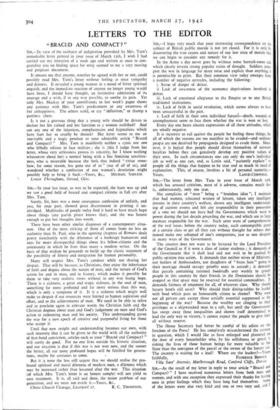Sta,—I hope very much that your interesting correspondence on the
subject of British public morale is not yet closed. For it is only by discovering the true causes and nature of our low state of morale that we can begin to consider any remedy for it.
In the Army a day never goes by without some barrack-room talk which clearly reveals strong popular trains of thought. Soldiers inter. pret the war in language far more terse and explicit than anything it is permissible to print. But their common view today emerges from a number of attitudes, including the following: i. Sense of danger of defeat.
ii. Lack of awareness of the economic deprivations involved in defeat.
iii. Lack of emotional allegiance to the Empire or to any British traditional institutions.
iv. Lack of faith in social revolution, which seems always to have been unsuccessful in the past. v. Lack of faith in their own individual future's—death, wounds or unemployment seem to face them whether the war is won or lost.
Every day one hears sincere expressions of all these attitudes, which are wholly negative.
It is incorrect to rail against the people for feeling these things, for all of which the reasons are too manifest to be evaded—and ordinary peop:e are not deceived by propaganda designed to evade them. More- over, it is logical that people should divest themselves of outworn loyalties before they can genuinely develop any positive values of their own. In such circumstances one can only do one's individual job as well as one can, and, as Lenin said, " patiently explain" to people all the things that happen to be true and so much in need of explanation. This, of course, involves a bit of personal austerity.—


























 Previous page
Previous page